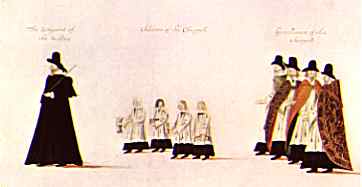Child Actors
Although they took part in plays on the Continent, and participated in the Commedia dell' Arte, women did not act on the English stage in Shakespeare's day. The parts of women, and sometimes of old men*, were acted by child actors--boys whose voices had not yet changed.
Children could be apprenticed to a mature actor, who would teach them the art of performance. Several sharers in the Lord Chamberlain's Men started out as child actors. Several of Shakespeare's plays, particularly the comedies, capitalize on the effect of boys acting women* -- who then take on disguise as boys.
It is clear that the boys were fine actors, since Shakespeare wrote some major parts* for the women in his plays. So popular were the young actors that whole acting companies* were created with child performers --the Children of the Chapel Royal, and the Paul's Boys. The children's companies played regularly at Court, and used the indoor theatres at St. Paul's and the Blackfriars.
The boys were chosen for their voices, and could be "pressed"-- forced into service, as soldiers were in time of war. They were educated in grammar and rhetoric as well as in singing and acting.
The puritans, who disapproved of the theatre in general, were particularly scandalized* by boys cross-dressing as women.
Footnotes
-
Old beyond his years
One child actor, Solomon Pavy, was pressed into service in 1600 at the age of 10; he performed in some of Ben Jonson's plays, and died in 1603. Jonson wrote a moving epitaph, in which he suggests that the child acted age too well:
Years he numbered scarce thirteen
When fates turn'd cruel,
Yet three fill'd zodiacs had he been
The stage's jewel:
And did act, what now we moan,
Old men so duly,
As, sooth, the Parcae [the three Fates] thought him one,
He play'd so truly. -
Boy is girl is boy
Sylvia (Two Gentlemen of Verona), Portia, Nerissa and Jessica (The Merchant of Venice), Rosalind (As You Like It), Viola (Twelfth Night), Imogen (Cymbeline) -- these are the best known. Shakespeare often exploits the extra layer of irony available in this situation by having the character refer to his/her/his male/female attributes.
Perhaps the most elaborate example is in the Epilogue to As You Like It, where Rosalind (a boy playing the part of a woman who disguises herself as a young man, and then reveals that he/she/he is really a woman) peels off the various layers of the onion, until finally the boy actor is left.
-
A big role for a young actor
Cleopatra, amazingly enough, was played by a child actor. At one point, as she is preparing herself and her attendants for death, she reminds them of their fate should they be brought to Rome, ironically reminding the audience at the same time that "she" was a boy:
The quick comedians
Extemporally will stage us, and present
Our Alexandrian revels: Antony
Shall be brought drunken forth, and I shall see
Some squeaking Cleopatra boy my greatness
I'th' posture of a whore.
(5.2.216-221) -
Blame the kids
A topical reference in Hamlet blames the popularity of the child acting companies for the players' having to tour as far afield as Elsinore:
Rosencrantz: There is, sir, an eyrie of children, little eyases, that cry out on the top of question and are most tyrannically clapped for't [a nest of children, whose voices carry above the sound of chatter, and who are excessively applauded for it].
-
A puritan's view
Philip Stubbes, a puritan and no friend of the acting companies, wrote of the licentious effect of watching all those sinful goings-on on stage:
Mark the flocking and running to Theatres and Curtains [the names of the first two theatres to be built in London], daily and hourly . . . where such wanton gestures, such bawdy speeches, such laughing and fleering, such kissing and bussing, such clipping and culling, such glancing of wanton eyes and the like is used as is wonderful to behold. Then, these goodly pageants being done, every mate sorts to his mate. . . and in their secret conclaves (covertly) they play the sodomites or worse.
(From The Anatomy of Abuses, 1583)
